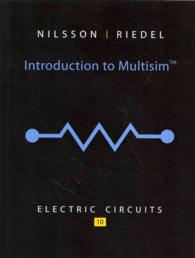Full Description
For courses in introductory Sociology. Exercises in Sociology, 2/E provides students with something more than just lecture and tests. While outside research is often reserved for upper division courses, this lab manual provides very concise and directed exercises that focus introductory students specifically on the nature of the task required. The result is a variety of exercises that provide "hands-on" experience with the subject matter of sociology.
Contents
Introduction Chapter 1-The Sociological Perspective The Promise, by C. Wright Mills Sociology on the Internet Marginal Voices in Sociology The Sociological Imagination Chapter 2-Research Methods Say What You Mean by G. Evans Witt Survey Design Participant and Non-Participant Observation Choosing a Research Approach Chapter 3-Culture Body Ritual Among the Nacirema by Horace Miner Cultural Diversity Cultural Universals and Rites of Passage Subcultures Chapter 4-Socialization Identity Transformation in a Maximum Security Prison by Thomas J. Schmid and Richard S. Jones Social-Psychology Theories Television as a Socializing Agent Life Course Socialization and Crisis Chapter 5-Social Interaction Pathology of Imprisonment by Philip G. Zimbardo The Social Construction of Reality Social Interaction Status and Role Chapter 6-Groups and Organizations "Banana Time" by Donald F. Roy Social Groups McDonaldization of Society Bureaucracy Chapter 7-Social Stratification No Degree, and No Way Back to the Middle by Timothy Egan Global Stratification Poverty in the United States Social Class in the United States Chapter 8-Deviance A Career Perspective on Heroin Use and Criminal Behavior by Charles E. Faupel Crime Statistics Criminal Court System Deviance Chapter 9-Sex and Gender A Woman Can Learn Anything a Man Can by Carolyn Turk Gendered Institutions Gender Socialization Women's and Men's Movements Chapter 10-Race and Ethnicity Anatomy of Environmental Racism by Robert D. Bullard Race in the United States Racial Group Relations Prejudice, Stereotypes and Discrimination Chapter 11-Political and Economic Sociology The Power Elite by C. Wright Mills Economy Types Types of Governmental and Political Systems Politics in the United States Chapter 12-The Family Love, American Style by Lisa E. Phillips Trends in Families and Households Family: Concepts and Functions Union Formation and Dissolution Chapter 13-Religion A Peculiar People by William W. Zellner Religiosity in the United States Religion: Concepts and Functions Types of Religious Organizations Chapter 14-Education The Negotiated Order of the Classroom by Tim O'Keefe and Charles E. Faupel Schools and Academic Standards Access to Higher Education School Choices Chapter 15-Medicine Millions for Viagra, Pennies for Diseases of the Poor by Ken Silverstein HIV/AIDS: Locally and Globally Mass Media and Eating Disorders Social Construction of Sickness and Disease Chapter 16-Population, Community and Urbanization Cornerville and its People by William Foote Whyte Demography Community Identity Urbanization Chapter 17-Environmental Sociology The Historical Transformation of a Grassroots Environmental Group by Kelly D. Alley, Charles E. Faupel and Conner Bailey Distribution of Environmental Hazards Environmental Toxins Sustainable Development and Environment Chapter 18-Social Change and Collective Behavior How Will the Internet Change Society? By Conrad L. Kanagy and Donald B. Kraybill Social Movements Collective Behavior Social Change








